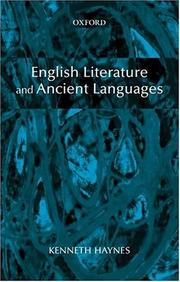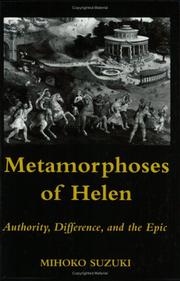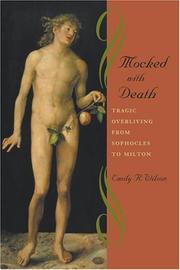| Listing 11 - 20 of 20 | << page >> |
Sort by
|
Book
Year: 1955 Publisher: Chapel Hill : University of North Carolina Press,
Abstract | Keywords | Export | Availability | Bookmark
 Loading...
Loading...Choose an application
- Reference Manager
- EndNote
- RefWorks (Direct export to RefWorks)
English literature --- Comparative literature --- Classical dictionaries. --- Mythology, Classical. --- History and criticism --- Classical and English. --- English and classical.
Book
Year: 1951 Publisher: London : Allen & Unwin,
Abstract | Keywords | Export | Availability | Bookmark
 Loading...
Loading...Choose an application
- Reference Manager
- EndNote
- RefWorks (Direct export to RefWorks)
English poetry --- Comparative literature --- Poésie anglaise --- History and criticism --- English and classical. --- Classical and English. --- Histoire et critique
Book
Year: 1961 Publisher: [Hamden] : Archon Books,
Abstract | Keywords | Export | Availability | Bookmark
 Loading...
Loading...Choose an application
- Reference Manager
- EndNote
- RefWorks (Direct export to RefWorks)
Satire, English --- Comparative literature --- Classical literature --- English literature --- History and criticism --- English and classical --- Classical and English
Book
Year: 1965 Publisher: Ann Arbor : University of Michigan Press,
Abstract | Keywords | Export | Availability | Bookmark
 Loading...
Loading...Choose an application
- Reference Manager
- EndNote
- RefWorks (Direct export to RefWorks)
Classical literature --- Literature, Comparative --- English poetry --- Classicism --- Appreciation --- Classical and English. --- English and classical. --- Classical influences. --- History --- Arnold, Matthew, --- Knowledge --- Literature.
Book
Year: 1957 Publisher: New York : Pageant book company,
Abstract | Keywords | Export | Availability | Bookmark
 Loading...
Loading...Choose an application
- Reference Manager
- EndNote
- RefWorks (Direct export to RefWorks)
English poetry --- Mythology in literature. --- Comparative literature --- Middle English, 1100-1500 --- History and criticism. --- Early modern, 1500-1700 --- Classical and English. --- English and classical.
Book
Year: 1957 Publisher: New York : Pageant Book Co.,
Abstract | Keywords | Export | Availability | Bookmark
 Loading...
Loading...Choose an application
- Reference Manager
- EndNote
- RefWorks (Direct export to RefWorks)
English poetry --- Mythology in literature --- Comparative literature --- Poésie anglaise --- Mythologie dans la littérature --- History and criticism --- Classical and English. --- English and classical. --- Histoire et critique
Book
Year: 1955 Publisher: Chapel Hill : University of North Carolina Press,
Abstract | Keywords | Export | Availability | Bookmark
 Loading...
Loading...Choose an application
- Reference Manager
- EndNote
- RefWorks (Direct export to RefWorks)
English literature --- Comparative literature --- Classical dictionaries --- Mythology, Classical --- Littérature anglaise --- Dictionnaires classiques --- Mythologie ancienne --- History and criticism --- Classical and English. --- English and classical. --- Histoire et critique

ISBN: 0199261903 0191532185 1281345784 0199212120 0191718661 9780199261901 Year: 2007 Publisher: New York: Oxford university press,
Abstract | Keywords | Export | Availability | Bookmark
 Loading...
Loading...Choose an application
- Reference Manager
- EndNote
- RefWorks (Direct export to RefWorks)
While the influence of Greek and Roman literature on British literature has been extensively surveyed, the role of those ancient languages themselves within modern British literature has only begun to be studied. This book is a study of the literary representation and dramatization of English in contact with Greek and Latin. - ;Literature in English is hardly ever entirely in English. Contact with other languages takes place, for example, whenever foreign languages are introduced, or if a native style is self-consciously developed, or when aspects of English are remade in the image of another
Civilization, Ancient, in literature. --- Classicism in literature. --- Classicism --- Comparative literature --- English language --- English literature --- Language and languages in literature. --- Classical and English. --- English and classical. --- Foreign elements --- Greek. --- Latin. --- Classical influences. --- English literature - Classical influences --- Literature, Comparative - English and classical --- Literature, Comparative - Classical and English --- English language - Foreign elements - Greek --- English language - Foreign elements - Latin --- Civilization, Ancient, in literature --- Language and languages in literature --- Classicism - Great Britain --- Classicism in literature --- Literature, Comparative

ISBN: 0801422191 0801480809 150173234X 9780801480805 Year: 1989 Publisher: Ithaca: London: Cornell University Press,
Abstract | Keywords | Export | Availability | Bookmark
 Loading...
Loading...Choose an application
- Reference Manager
- EndNote
- RefWorks (Direct export to RefWorks)
Authority in literature --- Classical literature --- Comparative literature --- English literature --- Epic literature --- Helen of Troy (Greek mythology) in literature --- Trojan War --- History and criticism --- Classical and English --- English and classical --- Literature and the war --- Homerus --- Vergilius Maro, Publius --- Shakespeare, William --- Spenser, Edmund, --- Knowledge --- Mythology. --- English language --- Classical Latin language --- Classical Greek language --- Thematology

Abstract | Keywords | Export | Availability | Bookmark
 Loading...
Loading...Choose an application
- Reference Manager
- EndNote
- RefWorks (Direct export to RefWorks)
In 'Paradise Lost', Adam asks, "Why do I overlive?" Adam's anguished question is the basis for a critical analysis of living too long as a neglected but central theme in Western tragic literature. Emily Wilson examines this experience in works by Milton and by four of his literary predecessors: Sophocles, Euripides, Seneca, and Shakespeare. Each of these writers composed works in which the central character undergoes unbearable suffering or loss, hopes for death, but goes on living. 'Mocked with Death' makes clear that tragic works need not find their moral and aesthetic conclusion in death and that, in some instances, tragedy consists of living on rather than dying. Oedipus's survival at the end of 'Oedipus Tyrannus' and 'Oedipus Coloneus' is clearly one such instance another Euripides' 'Heracles'. In Seneca's 'Hercules Furens', overliving becomes an expression of anxieties about both political and literary belatedness. In 'King Lear' and 'Macbeth', the sense of overliving produces a divided sense of self. For Milton, in both 'Samson Agonistes' and 'Paradise Lost', overliving is a theological problem arising from the tension between mortal conceptions of time and divine providence. Each writer in this tradition, Wilson concludes, attempts to diminish the anxieties arising from living past one's time but cannot entirely minimize them. Tragedies of overliving remain disturbing because they remind us that life is rarely as neat as we expect and hope it be and that endings often come too late.
Comparative literature --- Thematology --- English literature --- Classical literature --- anno 1600-1699 --- Bereavement in literature --- Death in literature --- Dood in de literatuur --- Helden in de literatuur --- Heldendom in de literatuur --- Heldhaftigheid in de literatuur --- Heroes in literature --- Heroism in literature --- Héros dans la littérature --- Héroïsme dans la littérature --- Mort dans la littérature --- Overleving in de literatuur --- Sterfte in de literatuur --- Survie dans la littérature --- Survival in literature --- Tragedie --- Tragedy --- Tragic [The ] in literature --- Tragique [Le ] dans la litterature --- Tragische [Het ] in de literatuur --- Tragédie --- Treurspel --- Classical drama (Tragedy) --- Classicism --- Death in literature. --- Heroes in literature. --- Literature, Comparative --- Survival in literature. --- Tragedy. --- Tragic, The, in literature. --- History and criticism. --- History --- Classical and English. --- English and Classical. --- Classical influences. --- Milton, John, --- Shakespeare, William, --- Characters --- Heroes. --- Tragedies. --- Milton, John --- Heroes --- Shakespeare, William --- Tragedies --- History and criticism --- Literature [Comparative ] --- Classical and English --- English and classical --- Classical influences
| Listing 11 - 20 of 20 | << page >> |
Sort by
|

 Search
Search Feedback
Feedback About UniCat
About UniCat  Help
Help News
News